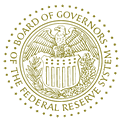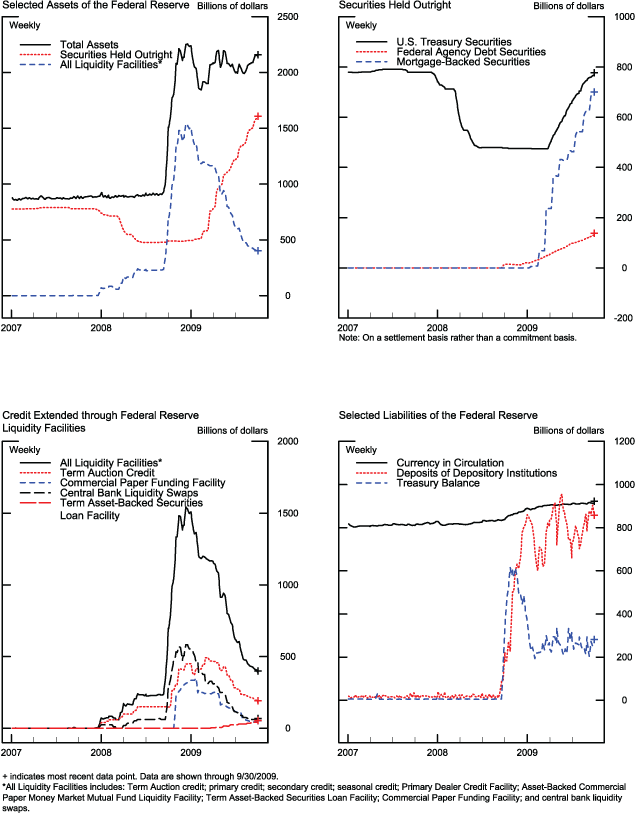Home
> Monetary Policy
> Quarterly Report on Federal Reserve Balance Sheet Developments
> Monthly Report on Credit and Liquidity Programs, 2009
> CLBS Report, October 2009


Monthly Report on Credit and Liquidity Programs
and the Balance Sheet
October 2009 (1.83 MB PDF)
| Purpose | Overview | SOMA Holdings and Liquidity Swaps |
Overview
Recent Developments
- Continued improvements in financial market conditions have been accompanied by further declines in credit extended through many of the Federal Reserve's liquidity programs. In response to these developments, the Federal Reserve has adjusted the size and frequency of many program operations.
- On September 23, 2009, the Federal Open Market Committee (FOMC) announced that the pace of purchases through its large scale asset purchase programs--specifically purchases of agency-guaranteed mortgage-backed securities (MBS) and agency debt--would slow, and that these purchases would be completed by the first quarter of 2010. In implementing this directive, the Open Market Trading Desk of the Federal Reserve Bank of New York announced that it would scale back the average weekly purchase amounts of agency MBS and reduce the size and frequency of agency debt purchases.
- The Federal Reserve also released operation schedules for the Term Auction Facility and Term Securities Lending Facility through January 2010. These schedules lay out the Federal Reserve's timeline for gradually scaling back the size of the credit facilities due to improvements in financial markets, while also taking account of the potential for temporary pressures in short-term funding markets around the year-end.
- On October 5, 2009, the Federal Reserve announced two changes to the procedures for evaluating asset-backed securities pledged to the Term Asset-Backed Securities Loan Facility (TALF). These changes are intended to promote competition among credit-rating agencies, ensure appropriate protection against credit risk for the U.S. taxpayer, and ensure that TALF collateral continues to comply with its existing high standards for credit quality, transparency, and simplicity of structure.
- In September 2009, Bank of America paid an exit fee in order to terminate the term sheet, initially entered into in January 2009, under which the U.S. Department of the Treasury, the Federal Reserve, and the Federal Deposit Insurance Corporation would have provided certain guarantees and residual financing to Bank of America to promote financial market stability. The term sheet was never implemented. The Federal Reserve's portion of the exit fee was $57 million.
- The Treasury announced on September 16, 2009, that the balance of the Supplementary Financing Account at the Federal Reserve likely would decrease to $15 billion in the coming weeks in order to preserve flexibility in the conduct of debt-management policy. As of September 30, 2009, the balance of this account was approximately $165 billion.
- As of September 30, 2009, the special drawing rights (SDRs) certificate account at the Federal Reserve increased to $5.2 billion as the Treasury issued $3 billion in certificates to the Federal Reserve to fund prospective purchases of SDRs from other countries seeking U.S. dollars.
- As required by Section 129 of the Emergency Economic Stabilization Act of 2008, the Federal Reserve must report to Congress on the status of its Section 13(3) credit facilities every 60 days. This assessment is included as an appendix to this report.
Table 1. Selected Assets, Liabilities, and Capital Accounts of the Federal Reserve System
Billions of dollars
| Item |
Current September 30, 2009 |
Change from August 26, 2009 |
Change from October 1, 2008 |
|---|---|---|---|
| Total assets | 2,144 | +66 | +638 |
| Selected assets | |||
| Securities held outright | 1,593 | +108 | +1,102 |
| U.S. Treasury securities1 | 769 | +24 | +293 |
| Agency securities1 | 131 | +14 | +116 |
| Agency-guaranteed mortgage-backed securities2 | 692 | +69 | +692 |
| Memo: TSLF3 | 0 | 0 | -236 |
| Memo: Overnight securities lending3 | 13 | -* | -11 |
| Memo: Net commitments to purchase MBS4 | 184 | +44 | +184 |
| Lending to depository and other financial institutions | 207 | -45 | -290 |
| Primary, secondary, and seasonal credit | 29 | -2 | -21 |
| TAF | 178 | -43 | +29 |
| PDCF | 0 | 0 | -147 |
| AMLF | * | 0 | -152 |
| Foreign central bank liquidity swaps5 | 57 | -3 | -230 |
| Lending through other credit facilities | 84 | -1 | +84 |
| Net portfolio holdings of CPFF LLC6 | 41 | -8 | +41 |
| TALF | 43 | +8 | +43 |
| Support for specific institutions | 100 | -1 | +9 |
| Credit extended to AIG, net7 | 39 | -* | -22 |
| Net portfolio holdings of Maiden Lane, Maiden Lane II, and Maiden Lane III LLCs8 | 62 | -* | +33 |
| Total liabilities | 2,093 | +65 | +628 |
| Selected liabilities | |||
| Federal Reserve notes in circulation | 873 | +3 | +69 |
| Deposits of depository institutions | 848 | -14 | +669 |
| U.S. Treasury, general account | 108 | +95 | +103 |
| U.S. Treasury, supplementary financing account | 165 | -35 | -179 |
| Other deposits | 16 | +16 | -15 |
| Total capital | 51 | +1 | +10 |
Note: Unaudited. Components may not sum to totals because of rounding.
* Less than $500 million. Return to table
1. Face value. Return to table
2. Current face value, which is the remaining principal balance of the underlying mortgages. Does not include unsettled transactions. Return to table
3.Securities loans under the TSLF and the overnight facility are off-balance-sheet transactions. These loans are shown here as a memo item to indicate the portion of securities held outright that have been lent through this program. Return to table
4. Current face value. These generally settle within 180 days and include commitments associated with outright transactions as well as dollar rolls. Return to table
5. Dollar value of the foreign currency held under these agreements valued at the exchange rate to be used when the foreign currency is returned to the foreign central bank. Return to table
6. Includes commercial paper holdings, net, and about $5 billion in other investments. Return to table
7. Excludes credit extended to Maiden Lane II and III LLCs. Return to table
8. Fair value, reflecting valuations as of June 30, 2009. Fair value reflects an estimate of the price that would be received upon selling an asset if the transaction were to be conducted in an orderly market on the measurement date. Fair values are updated quarterly. Return to table
* Less than $500 million. Return to table
1. Face value. Return to table
2. Current face value, which is the remaining principal balance of the underlying mortgages. Does not include unsettled transactions. Return to table
3.Securities loans under the TSLF and the overnight facility are off-balance-sheet transactions. These loans are shown here as a memo item to indicate the portion of securities held outright that have been lent through this program. Return to table
4. Current face value. These generally settle within 180 days and include commitments associated with outright transactions as well as dollar rolls. Return to table
5. Dollar value of the foreign currency held under these agreements valued at the exchange rate to be used when the foreign currency is returned to the foreign central bank. Return to table
6. Includes commercial paper holdings, net, and about $5 billion in other investments. Return to table
7. Excludes credit extended to Maiden Lane II and III LLCs. Return to table
8. Fair value, reflecting valuations as of June 30, 2009. Fair value reflects an estimate of the price that would be received upon selling an asset if the transaction were to be conducted in an orderly market on the measurement date. Fair values are updated quarterly. Return to table
Figure 1. Credit and Liquidity Programs and the Federal Reserve's Balance Sheet

Last update:
August 2, 2013


